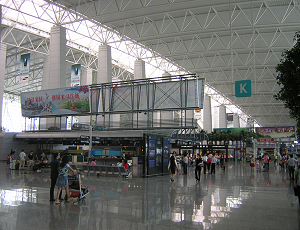New Horizons: Investing in China’s Civilian Airport Industry
By Tongyu Zhang
 A recent guideline issued by the Civil Aviation Administration of China (CAAC) has encouraged private investment into China’s civilian airports. Along with reducing the number of state-owned and state-holding airports, private investors now have full access to the construction and operation of civilian airports as well as their affiliated facilities. Intermediate services, such as consulting, designing, and maintenance of airports, are now also open to qualified private and foreign entities. In addition, the approval mechanism for private investment into terminals, logistics, and other operations have been removed. The guideline also emphasized innovation of financing methods for the construction and operation of airports, especially in regards to the public-private partnership (PPP) structure.
A recent guideline issued by the Civil Aviation Administration of China (CAAC) has encouraged private investment into China’s civilian airports. Along with reducing the number of state-owned and state-holding airports, private investors now have full access to the construction and operation of civilian airports as well as their affiliated facilities. Intermediate services, such as consulting, designing, and maintenance of airports, are now also open to qualified private and foreign entities. In addition, the approval mechanism for private investment into terminals, logistics, and other operations have been removed. The guideline also emphasized innovation of financing methods for the construction and operation of airports, especially in regards to the public-private partnership (PPP) structure.
As stated by the CAAC, in 2015, the civil aviation industry transported 436 million passengers and around 6.3 million tons of cargo and mail, and maintained steady performance growth despite the pressure of the slowing global economy. With an estimated market value exceeding US$1 trillion, China is expected to become the world’s largest aviation market over the next two decades, according to US plane makers Boeing. A positive regulatory environment, in conjunction with policies such as the 13th Five Year Plan and the ‘One Belt, One Road’ initiative urging for larger and more efficient aviation services, provide vast opportunities for private investment in China’s airports. However, strict supervision from government authorities and a relatively limited track record for foreign companies participating in such projects act as considerable obstacles for foreign investors.
![]() RELATED: Business Advisory Services from Dezan Shira & Associates
RELATED: Business Advisory Services from Dezan Shira & Associates
Paths to participate in China’s civilian airports market
By the end of 2015, China had 210 civilian airports. This number will increase to more than 260 by 2020, according to the 13th Five Year Plan. Accordingly, an RMB 77 billion (US$11.9 billion) investment into the construction of civil aviation infrastructure was announced by the CAAC in May 2016, including 11 key construction projects and 52 aviation upgrades.
The construction of an airport is a complex systematic project that includes counselling, design, construction, and maintenance. Several foreign companies already have experience participating in the preparation stage of designing and counselling in Chinese airport projects, such as in the design of Beijing Capital Airport and Guangzhou Baiyun Airport. As the intermediate service market opens up, qualified foreign investors can choose to participate in other stages of the construction process, either individually or as a joint venture. Furthermore, the new guidelines state that private capital can be invested in the comprehensive development of the land, real estate, advertising, and other facilities included in the airport economic zone accompanying the establishment of an airport.
Approval for private investment on commercial operations of an airport, such as terminals, logistics, warehousing, and ground service, will no longer be needed. This simplified procedure removes barriers for foreign companies to invest in the operations of civilian airports. The Aviation Industry Corporation of China (AVIC) predicts an increase of 4,583 civilian airliners in China over the next 20 years, indicating the growing need for related airplane support and customer services based in airports.
The mutual investment relationship between general airports and other market entities is not limited, according to the CAAC. China has a relatively less developed general aviation sector compared with its fast-growing aviation industry. However, the General Office of State Council has recently published a guideline to accelerate the development of general aviation, with a goal of building 500 general aviation airports by 2020. Together with the CAAC guideline, general airport investment should promote foreign investors’ entry into China’s broader – and even more prosperous – general aviation sector.
![]() RELATED: How China’s VAT Reform Has Affected Real Estate and Construction
RELATED: How China’s VAT Reform Has Affected Real Estate and Construction
Airport funding methods
The current funds for the construction of airports in China is mainly contributed by local governments and civil aviation development funds. But with the high debt ratio of local governments, this funding structure will no longer be sustainable, and thus the introduction of private capital will become more instrumental in the construction and operation of new civilian airports. Based on the new guideline, private capital can directly participate with several different forms such as franchising, transfer of operation or stock rights, and entrusted operation. Alternatively, private capital can be invested in airport-related trust schemes or equity funds.
The PPP model has a track record in the construction of transportation infrastructure in mainland China. In terms of airports, the establishment of Hong Kong Zhuhai Airport Management in 2006 allowed Hong Kong International Airport to hold stake in and manage the operation of Zhuhai Airport. This kind of practice can be used as a reference for foreign companies to participate in China’s civilian airport market. In addition, the National Development and Reform Commission (NDRC) issued a circular in August to promote PPP in traditional infrastructure fields, and the civilian airports sector is specifically listed in the catalogue.
However, the proportion of foreign investment in Chinese PPP projects has been low in recent years for a variety of reasons, including the high risk and cost of such investments. Project implementation, investment withdrawal mechanisms, and the credit system can all pose risks for foreign investors. For instance, the construction of a project may be interrupted by unexpected social or financial reasons, and the risk of a local government default. Further, foreign investors need to bear a relatively high cost for communication and evaluation, such as negotiating with the local government through an agent, as well as conducting extensive due diligence. Partnering with domestic enterprises, especially state or local government owned enterprises, is a viable way to get involved.
Observations
China’s civilian airport market is multi-dimensional; therefore, it is critical for foreign companies and investors to identify their position in the market. Qualified professional service providers should focus on their specific professional field, be it environmental consulting or special equipment provision. General aviation airports are a good entry point, especially for experienced foreign general aviation companies. Also, unlimited inter-investment between airports and other related market entities offers a key access point to the whole industry. However, due to the capital-intensive and comprehensive nature of civilian airport projects, foreign investors will inevitably need to develop a suitable PPP model in order to participate in the market.
|
Asia Briefing Ltd. is a subsidiary of Dezan Shira & Associates. Dezan Shira is a specialist foreign direct investment practice, providing corporate establishment, business advisory, tax advisory and compliance, accounting, payroll, due diligence and financial review services to multinationals investing in China, Hong Kong, India, Vietnam, Singapore and the rest of ASEAN. For further information, please email china@dezshira.com or visit www.dezshira.com. Stay up to date with the latest business and investment trends in Asia by subscribing to our complimentary update service featuring news, commentary and regulatory insight.
|

 Establishing & Operating a Business in China 2016
Establishing & Operating a Business in China 2016
Establishing & Operating a Business in China 2016, produced in collaboration with the experts at Dezan Shira & Associates, explores the establishment procedures and related considerations of the Representative Office (RO), and two types of Limited Liability Companies: the Wholly Foreign-owned Enterprise (WFOE) and the Sino-foreign Joint Venture (JV). The guide also includes issues specific to Hong Kong and Singapore holding companies, and details how foreign investors can close a foreign-invested enterprise smoothly in China.
 Tax, Accounting, and Audit in China 2016
Tax, Accounting, and Audit in China 2016
This edition of Tax, Accounting, and Audit in China, updated for 2016, offers a comprehensive overview of the major taxes that foreign investors are likely to encounter when establishing or operating a business in China, as well as other tax-relevant obligations. This concise, detailed, yet pragmatic guide is ideal for CFOs, compliance officers and heads of accounting who must navigate the complex tax and accounting landscape in China in order to effectively manage and strategically plan their China-based operations.
 An Introduction to Doing Business in China 2016
An Introduction to Doing Business in China 2016
Doing Business in China 2016 is designed to introduce the fundamentals of investing in China. Compiled by the professionals at Dezan Shira & Associates in June 2016, this comprehensive guide is ideal not only for businesses looking to enter the Chinese market, but also for companies who already have a presence here and want to keep up-to-date with the most recent and relevant policy changes
- Previous Article Funding China’s Civil Society – Tax Incentives, Donation Law, and the Role of Foreign Charities
- Next Article Preventing Insolvency: How to Plan the Cash Flow and Financing of a WFOE in China









